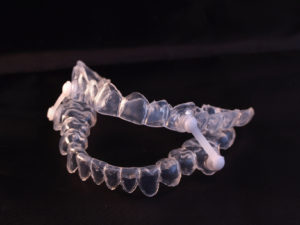Can Sleep Apnea Lead to TMJ Disorder? The Surprising Answer
December 1, 2022

Many people affected by sleep apnea snore at night and feel tired and irritable during the day. However, researchers have recently discovered that this common sleep disorder may also contribute to persistent jaw pain. Want to know more? Keep reading to learn about the surprising connection between sleep apnea and TMJ disorder.
What Is Temporomandibular Disorder?
The temporomandibular joint (TMJ) is located on either side of your head where your jaw meets your upper skull. The complex joint guides the jaw movements that allow you to eat, speak, yawn, and laugh. Pain connected to the TMJ is referred to by the umbrella term temporomandibular joint disorder. TMJ disorder can be caused by various factors, including poor posture, stress, grinding teeth, and bite misalignment. People who suffer from TMJ disorder often experience headaches, difficulty chewing, and/or a clicking sound when opening or closing their mouths, among other uncomfortable symptoms.
What Is Sleep Apnea?
Sleep apnea is a common sleep disorder characterized by repeated breathing interruptions. Obstructive sleep apnea, which is the most common form, occurs when a person’s neck tissue relaxes and blocks airflow. This blockage can cause a person’s breathing to stop for 10 seconds or longer while they sleep. These pauses in breathing can occur dozens or even hundreds of times a night. If left untreated, sleep apnea can lead to serious health problems, including high blood pressure, heart attack, strokes, and more.
TMD & Sleep Apnea
Medical researchers estimate that over 40% of people with TMD also have trouble sleeping. Some scientists believe that when sleep apnea causes a person’s airway to become blocked, the body responds by pushing the lower jaw forward to re-open the airway. This frequent jaw movement can cause extra stress and put tension on the TMJ. Alternatively, if a person’s jaw is naturally misaligned, its awkward position can both block air passage at night and cause jaw pain.
How to Treat TMD & Sleep Apnea
Whether you suffer from sleep apnea or jaw pain – or both! – your dentist may be able to provide relief with oral appliance therapy. An oral appliance is a custom mouthpiece worn at night to reposition the jaw. The device alleviates sleep apnea symptoms by preventing the airway from becoming blocked. Wearing an oral appliance also allows the jaw to rest, relieving the pressure that may otherwise contribute to TMJ disorder.
Jaw pain and sleep apnea can have a significant negative impact on your quality of life. Don’t hesitate to contact your dentist today to learn if you could benefit from oral appliance therapy.
About the Author
Dr. Ivan Paskalev has over two full decades of experience as a dentist. An active member of the Oregon Dental Association, he is currently pursuing the American Academy of Dental Sleep Medicine’s Mastery Program to further elevate his clinical skill set. To learn more about the connection between sleep apnea and TMJ disorder, visit the Better Sleep Eugene website or call 541-246-8284.

